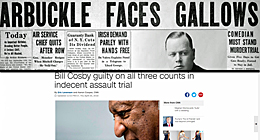


The Hanging Judge of the Court of Public Opinion
[by Howard Fencl, Hennes Communications] When the charges you face are shocking and severe – damning charges that chafe the deepest ingrained norms of our society, such as rape and murder – the Court of Public Opinion can forever decide your fate no matter what happens in a courtroom. If you are deemed guilty by our justice system, the Court of Public Opinion is vindicated and moves on to its next cause célèbre. But if our legal system finds you NOT guilty, the trash-talk narrative fomented by the Court of Public Opinion can still spell your lifelong ruin.
Two examples. Both comedians.
The first, who had massive success as a standup comedian and as “America’s Dad” on primetime TV, has just been convicted of aggravated indecent assault for drugging and sexually assaulting a young woman. She was one of 60 women with the courage to come forward and report that the comedian had drugged and raped them. Most will agree this was justice finally served on Bill Cosby – and some measure of validation for the many women who for years accused Cosby of similar acts and were ignored or dismissed.
The other was one of the richest men in Hollywood – a highly-influential comedian beloved by the film-going public – and charged with raping and murdering a young woman at a wild, three-day, booze-fueled party. An outcry for the death penalty among an outraged public fueled lurid newspaper headlines. The more the newspapers sold, the more accusatory the headlines became. A faked news photo of the comedian behind bars was published – the bars had been convincingly superimposed on an earlier photo.
After two trials resulted in hung juries, a jury unanimously acquitted the comedian in a third trial, and issued an unprecedented apology with the verdict:
We feel that a great injustice has been done to him … there was not the slightest proof … to connect him in any way with the commission of a crime. He … told a straightforward story which we all believe. We wish him success and hope that the American people will take the judgment of fourteen men and women that [he] is entirely innocent and free from all blame.
If the second example is unfamiliar, it’s because the incident happened almost 100 years ago. The death of 26-year-old Hollywood ingénue, Virginia Rappe, in 1921, remains a mystery. But the Court of Public Opinion forever damned the career of comedian Roscoe “Fatty” Arbuckle, who was found innocent of her murder. Still, the public and the film industry couldn’t shake the association between Arbuckle and the salacious charges he faced. His films were pulled from distribution, and the negatives were burned. He was banned from acting in the industry. He got around that by directing a few films under a pseudonym. Just as Arbuckle was on the brink of a comeback, he died of a heart attack in 1933 at age 46.
Feverish rumors. Scandalous publicity. A public pitchfork mentality. Fake news. It didn’t matter that there was no social media in 1921 – the public fanned the flames of the Roscoe Arbuckle scandal with their wallets by buying hundreds of thousands of newspapers – the old fashioned way of “liking” a news story.
The common element 100 years ago and now is the lingering poison the Court of Public Opinion can confer on reputation. Cosby was found guilty in a court of law of drugging and sexually assaulting Andrea Constand, a former employee at Temple University where Cosby had served as a powerful trustee. He is a sex offender and should be punished to the fullest extent of the law.
But guilty or not, the Court of Public Opinion shred his reputation the moment allegations came to light. Would his career have survived an innocent verdict?
Arbuckle was found innocent of rape and murder. But the Court of Public Opinion never let him live down the charges. He went broke paying legal fees. High-caliber industry colleagues, such as Charlie Chaplin and Buster Keaton, spoke publicly about Arbuckle’s integrity and character. But to no avail.
For the innocent, defending reputation against such serious charges is the ultimate uphill battle. Being proactive with the truth and getting your story out first, getting it out aggressively, truthfully and frequently to your key audiences, to media and social media is vitally important. Correcting misinformation – and disinformation – is equally important. Mustering respected third-party allies who will speak on your behalf can strengthen your case in the Court of Public Opinion.
Unfortunately, none of that worked for Roscoe Arbuckle. And if the charges against you are severe enough, they may not work for you, either, no matter your innocence. Those finding themselves in that unlucky scenario, who can still muster the strength, are best served retreating into family, re-inventing themselves elsewhere, and starting over.
_____
Few Roscoe “Fatty” Arbuckle films survive. After their intentional destruction, a few films and fragments were found abroad because of their global distribution. Here is one of Arbuckle’s restored shorts, “The Garage,” with Buster Keaton.